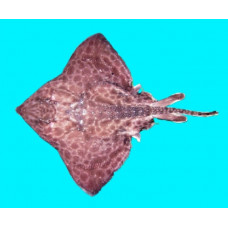Latin name
Amblyraja georgiana
Other name
Amblyraja georgiana
Identification
The body is relatively thick and heavy. The snout is rather short. The rostral cartilage is stiff. The eyes are small. There are 5 gill slits, nostrils and a mouth on the ventral side of the disc. There are lateral wrinkles on the slender tail.
Features of fish fins
The broad and flat pectoral fins of these rays form a rhombic disc with a triangular snout and rounded edges. They have 2 reduced dorsal fins and a reduced caudal fin.
Fish colouring
Adult colouration varies from pale grey-brown to dark brown, with a variety of markings. Juveniles have a lighter and more contrasting pattern. The abdomen is whitish with dense grey margins on the posterior part of the disc and on the abdomen. The underside of the tail is white with a grey stripe.
Distribution
Widespread in Antarctic waters of the Southern Ocean between 54°S and 74°S. Southern Ocean: around the island of South Georgia and on the ridge west of the Black Rocks. Southeast Pacific: Chile. Occasionally found on the Scotia Ridge. Records of its presence off the Falkland Islands are erroneous and refer to other species in the genus Amblyraja.
Habitat
These are bottom stingray. They occur in the upper and middle part of the continental slope at depths of 150-800 m, most commonly at depths of around 400 m.
Size
The maximum recorded length of individuals of this species is 101 cm.
Behavior
Occupies continental and island shelves and upper slopes. Clear mating behaviour with cuddling. Cubs may tend to follow large objects such as the mother.
Food and feeding habits
Their diet consists of polychaetes, crustaceans and small bony fish.
Reproduction
Antarctic starry skates reach maturity when they are 80-90 cm long. They lay eggs in a hard, horny capsule with projections at the ends. The capsule is 11.6 cm long and 8 cm wide. The embryos feed exclusively on the yolk. Newborns are about 16-18 cm long.
Fishing
These rays are not targeted. They are caught as by-catch.
Relationship with a person
Harmless. Used as fishmeal and probably not used for human consumption due to excessive roughness of scales.
| Classification | |
| Phylum | Chordata |
| Class | Chondrichthyes |
| Squad | Rajiformes |
| Family | Rajidae |
| Genus | Amblyraja |
| Species | A. georgiana |
| Features | |
| Conservation status | Data Deficient |
| Habitat | Bottom |
| Life span, years | No information |
| Maximum body weight, kg | No information |
| Maximum length, cm | 101 |
| Sailing speed, m/s | No information |
| Threat to people | Not edible |
| Way of eating | Predator |
Antarctic starry skate
Tags: antarctic starry skate

